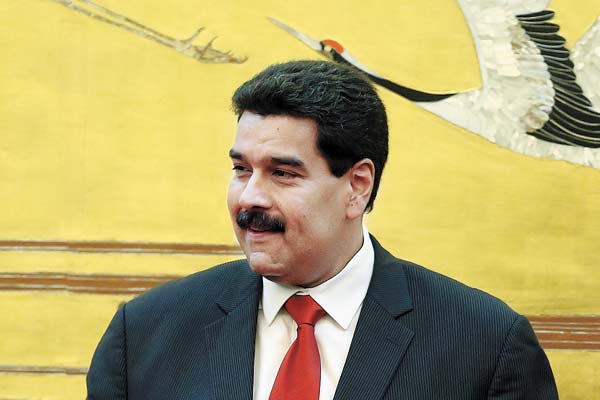China signs 12 deals with Venezuela
Maduro's first visit as president shows healthy relations 'continue'
Venezuelan President Nicolas Maduro is proudly recording every achievement of his first trip to China since being elected on his new Sina Weibo account.
The achievements, ranging from multibillion-dollar oil deals to agricultural deals, were signed on Sunday by companies and government agencies from the two countries as President Xi Jinping hosted Maduro for a state visit in Beijing.
 |
|
Visiting Venezuelan President Nicolas Maduro arrives at the Great Hall of the People in Beijing on Sunday.[Wu Zhiyi / China Daily] |
The meeting, the first between the two leaders after they both took office this year, marked a smooth transition of close ties between the countries, analysts said.
Throwing a warm welcoming ceremony for his Venezuelan counterpart, Xi told Maduro after the ceremony that his visit to China "will certainly promote China-Venezuela relations to new heights".
Maduro, though, is no stranger to Beijing. He played a big role in facilitating the expansion of ties with China, serving as Venezuela's foreign minister from 2006 until the beginning of this year.
The main goal of the trip is to consolidate and expand the strategic partnership between Venezuela and China that former president Hugo Chavez began with Chinese leaders, Maduro told Xi.
Maduro said that China's development has benefited Venezuela.
The meeting on Sunday witnessed the signing of 12 cooperation agreements on energy, education, agriculture and construction.
Among them, Venezuelan oil giant Petroleo de Venezuela SA reached a $1.4 billion deal with China Petrochemical Corp to develop Venezuela's Junin 1 heavy oil bloc, which will produce 200,000 barrels a day.
The country has also secured an agreement with China Development Bank on a $5 billion line of credit for social development.
The Export-Import Bank of China will lend Venezuela's state petrochemicals company Pequiven $390 million for the construction of a port.
Venezuela has also secured funding from Chinese banks for a mining survey around the country and has agreed with China's CITIC Group to move forward with gold mining projects in Venezuela's Las Cristinas deposits.
According to Wang Zhen, former ambassador to Venezuela, Maduro's first trip to China after being elected president can be regarded as continuing Chavez's policy on China.
"The decision helps fuel economic development of Venezuela, and will help increase its international status. It can also help secure the government of Maduro," Wang said.
In the post-Chavez era, Maduro is facing great challenges, especially the imbalance of social and economic development. His narrow electoral win will prompt him to advance social reform and improve the economy.
According to Wu Baiyi, a researcher specializing in the Latin American economy with the Chinese Academy of Social Sciences, China, as the major oil export market of Venezuela, is very important for the country.
Venezuela needs to guarantee close and increasing economic cooperation to gain more money for its domestic reforms, Wu said.
According to Wang Zhen, China has invested a large sum of money to build refineries and related industries.
"The future of resource cooperation between the two countries is rather optimistic," Wang said.
Venezuela, with 297 billion barrels of proven crude oil reserves, has surpassed Saudi Arabia to become the nation with the largest proven crude oil reserves in the world. As one of the main pillars of OPEC, Venezuela also takes an important role in ensuring China's energy security and balance.
Venezuelan Oil and Mining Minister Rafael Ramirez said earlier that Venezuela exported 626,000 barrels of oil per day to China in the first four months of this year and the figure is expected to reach 1 million barrels per day within two years. In 2012 China imported a total of 5.1 million barrels of oil per day from abroad.
Beijing is now Caracas' second-largest trading partner in Latin America. Bilateral trade was only $350 million in 2000, but it reached $23 billion in 2012 after the two sides initiated several multibillion projects.
During the talks on Sunday, the two leaders also pledged to enhance China-Latin America cooperation.
Since Maduro has just assumed the rotating chair of the South American regional bloc Mercosur, Venezuela is expected to strengthen the dialogue between Mercosur and China through the visit.



























